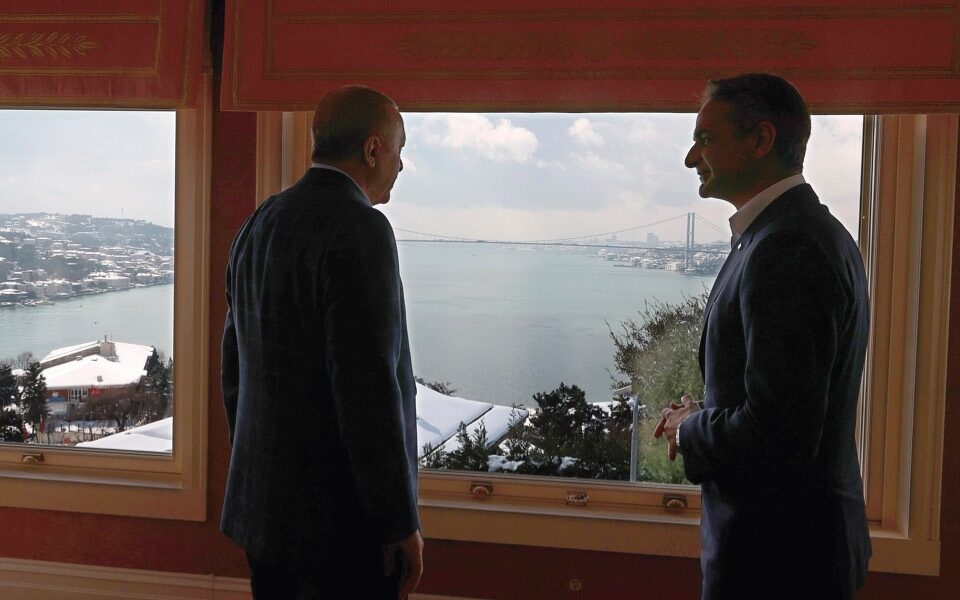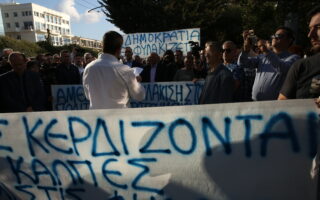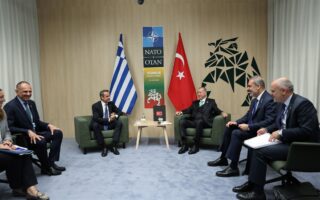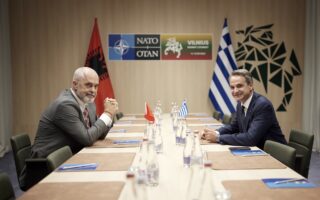Weighing the facts on the road to The Hague

During their recent meeting on the sidelines of the NATO summit at Vilnius, Greek Prime Minister Kyriakos Mitsotakis and Turkish President Recep Tayyip Erdogan appeared ready for a tentative rapprochement that may lead to a negotiation down the line. Even though such a prospect is still a long way away, the discussion has already started – with no shortage of passion and hyperbole. Taking a close look at the prospects for talks, there are three elements – related ones – that are key to any negotiation going forward: the terms and framework under which they will be conducted, the alternatives in the event that an agreement is not reached, and the timing. The question of timing, for example, refers both to which of the two sides is more pressed for a deal and also to the evolution of events that affect the dynamic between the two sides and would inevitably also influence their alternatives.
Terms & framework
After nearly four years of unprecedented tension and aggression on Turkey’s part, Ankara appears to have abandoned – for the time being at least – the tactic of coercion diplomacy by exercising constant and mounting pressure on Greece, in favor of de-escalation. Most analysts have attributed this change of attitude to earthquake diplomacy, though there had been signs of a thaw before that too. In fact, February’s devastating earthquakes in Turkey and Greece’s immediate response with assistance simply helped the thaw take place by providing a convenient alibi for the shift in Ankara’s stance, even if it was just a tactical decision. The shift came in the wake of similar overtures by Turkey to Israel, Egypt, Saudi Arabia and the United Arab Emirates. The reasons, therefore, run deeper and have to do with the state of the Turkish economy and the war in Ukraine. The war, in particular, has affected and even limited Turkey’s options on several levels.
The Ukraine war has served as proof that revisionism comes at a cost, especially when accompanied by international destablization, and even more so when it threatens Western and NATO unity
To begin with, it has served as proof that revisionism comes at a cost, especially when accompanied by international destablization, and even more so when it threatens Western and NATO unity. The cohesion shown by the West and the fact that the overwhelming majority of states in the Alliance are on the same page with regard to the Russian threat has restricted Ankara’s scope, even though its role has been elevated by the war. Furthermore, Moscow’s fall from grace, the reversal of roles between Turkey and Russia, NATO’s expansion and the United States’ fresh interest in Europe have shaped a new security environment that does not favor the aggression and the strategic autonomy that Ankara has always sought. At the same time, Greece’s enhanced status in the Western camp – both as a result of its stance on Ukraine and because of Alexandroupoli port’s multifaceted geopolitical role – has had a significant impact on Turkey’s strategic planning.
It comes as no surprise, therefore, that both the US and the European Union have renewed their interest in seeing Greek-Turkish relations improve. Without overlooking the fact that Turkish revisionism is the main problem, the above create a situation that could facilitate a more meaningful negotiation on the basis of international law, just as Athens has consistently wanted for half a century.
The (non) alternatives
Realistically, maintaining the status quo is the only alternative that would not lead to conflict – something that would be devastating in every respect for both sides. It is the option with the smallest political toll, though it is not without cost. Greece is spending enormous amounts of money and diplomatic capital on prevention and deterrence. It is estimated that Greece has been spending around 4% of its gross domestic product on defense annually in the past 50 years, on average. At present prices, we have spent nearly 400 billion euros (equal to the public debt). It is likely, therefore, that the arms race prompted by our dispute over the continental shelf will cost us a lot more than any anticipated earnings from the discovery of valuable resources. Furthermore, there is also the question of missed opportunities. If this money were instead invested in the welfare state, in infrastructure and in other essential areas, it would bring significant benefits to the economy and society. What’s more, hydrocarbon deposits will be of little value in a few years’ time as a result of the climate crisis and the green transition that it will inevitably prompt.
By kicking the can down the road, therefore, we may maintain our “sovereign rights” at the theoretical (and indeed imaginary) level, but in practical terms, by not delineating, we will have nothing beyond 6 nautical miles. We want an exclusive economic zone that stretches all the way to Cyprus, but for the time being, we can’t even conduct seismic surveys in the middle of the Thermaic Gulf, off the coast of Thessaloniki.
Many analysts and pundits are opposed to a rapprochement with Turkey because of its recidivism, while they also doubt – quite reasonably – to what degree Ankara would agree to a solution based on international law. The problem with such analyses is that they may not be wrong in terms of their arguments, but they fail to present a credible and realistic alternative. They present challenges without solutions, and the result is ultimately the same: no progress. And if there is one side that wants to prevent talks from taking place, that should not be Greece.
Rejectionism (even when justified) creates denial and offers no solutions. Voluntarism that is completely out of touch with reality leads to dangerous self-deception and strategic impasses. In many cases when some kind of response from the Greek side is suggested, the recommendation tends to be off the mark, unrealistic and bordering on the dangerous. Throughout, Greece has based its strategy on international law and any deviation from these principles is a strategic mistake. Any unilateral moves from Greece would justify Turkish reactions, put us on a par with it and shift the resolution process from the arena of the law (where we have a comparative advantage) to the arena of might. Consistency is, after all, one of Greece’s greatest comparative advantages vis-a-vis its neighbor.
Proposals for an immediate EEZ delimitation agreement with Cyprus in order to present Ankara with a fait accompli are also impractical. It would raise eyebrows in neighboring countries, such as Egypt – a significant regional player and one of the most important Arab states with which we want a trusting and functional relationship – while the international community would see it as contravening the Law of the Sea, the very legislation invoked by Greece. Most importantly, though, it would prompt an immediate response from Ankara, which would censure us for excluding it from the discussion before going on to violate the agreement with Nicosia in all manner of ways (with seismic survey vessels, drillships etc), thus putting us in a position where we would have to defend the EEZ. And given Cyprus’ objective weakness, we would be alone in this task.
Others still argue that Greece needs to respond to Turkey’s claims with claims (for what?) of its own, that we too should adopt a revisionist stance, that we should follow in Turkey’s footsteps even though we do not have the same characteristics. They suggest that we should sit down as revisionist to revisionist, putting all of our respective claims on the table, instead of talking like a state that defends the status quo on the basis of international law. This is an approach that is typically shortsighted, both at the strategic and tactical levels.
Then there are those who, bizarrely, admire Turkey’s foreign policy and Erdogan’s actions, outdoing even the Anadolu news agency with their talk of the “president’s success.” Erdogan is practically without fault in their eyes. Given, however, how often and how quickly his policy changes, it makes no sense to regard one move as a success when he goes on to do the exact opposite a few days later. What these “admirers” of Turkish foreign policy are doing is, essentially, confusing the country’s geopolitical significance with its strategic one. If Turkey did not have the Straits, if it were not on the Black Sea and did not share borders with Iran, Iraq, Syria and Central Asia; if it did not have a youthful and robust population of 85 million and the second-largest military in NATO (also being the only Muslim country in the Western Alliance), no one would tolerate Erdogan’s blackmail and antics. No one would tolerate his ties with Russia’s Vladimir Putin and the way he has undermined the sanctions against Russia. No one would care if Turkey were “lost.” Anyone who has spoken with international players knows that Turkey (and its president especially) may be regarded as a valuable piece on the geopolitical chessboard but is also seen as equally unreliable in Western capitals.
Timing
For several reasons related to timing, this moment appears to be the most opportune period in the last two decades to initiate substantial dialogue with Turkey. Our relations are not developing in a vacuum but within an international system where the West seeks to redefine its status and regional as well as global security architecture following the Russian invasion of Ukraine. At the same time, the priorities of both leaderships differ, particularly in Turkey’s case. Erdogan is facing pressure to revive the economy, which in turn requires adjustments not only in the economic realm but also in the geopolitical reality. Ankara must consider how it can attract investment capital beyond simply selling off national assets to Arab monarchies, as its external policy actions are causing instability. If it undermines the interests of the West on every occasion, how can it expect political and economic support from those countries?
The arms race prompted by our dispute over the continental shelf will cost us a lot more than any anticipated earnings from the discovery of valuable resources
Therefore, at this historic juncture, Turkey cannot continue its policy of coercion against Greece without facing significant consequences. It is now politically evident to most of Greece’s partners that any process or negotiation should strictly adhere to international law. Both the US and the EU have recognized the transactional logic guiding Turkish actions and, accordingly, adjusted their stances. Any overtures they make toward Turkey are contingent on the latter’s compliance with agreed-upon terms and a quid pro quo approach, with the potential for reversibility. Ankara must in the foreseeable future strive to improve, and perhaps even rekindle, its relationship with the West due to its economic needs. President Erdogan even brought up the modernization of the Customs Union, which could involve borrowing European money to avoid dealing with the IMF. Greece and Cyprus would have a say in this. Additionally, even under terms of hard power, the current situation has visibly improved. To conclude, it is unlikely that a more favorable conjuncture will arise in the foreseeable future.
Of course, the future is inherently unpredictable, but we can identify certain trends and make projections. The international system, based on rules, is currently in a state of flux. The rules that underpin our rights and strategy are facing challenges from various directions. Russia’s invasion of Ukraine is causing significant disruptions to Europe’s post-war security architecture, while in the South China Sea, China continues to violate and disregard the Convention on the Law of the Sea. Moreover, any change in US leadership may further disrupt balances, and the European Union’s internal divisions are hindering its ability to achieve strategic autonomy. As Simon Tisdall pointed out in The Guardian: “Instability grips a weakened Europe as global predators smell blood – threats from Russia and China, weakening security alliances with the US, and internal social and political divisions reveal fundamental strategic weaknesses. Europe increasingly resembles a beleaguered democratic island in an anarchic world, where a rising tide of authoritarianism, impunity and international rule-breaking threatens to inundate it.”
Furthermore, the evolution of parameters affecting the balance of power and the dynamics of relations with Turkey is critical. Over the past 50 years, all comparative indicators, both qualitative and quantitative, have shifted against Greece. In 1970, we had almost the same GDP as Turkey, and Turkey had a population four times larger than Greece’s. Today, Turkey’s GDP is four times larger than Greece’s, and its population is nearly nine times larger, with an average age of 31, much younger than Greece’s, which is around 45. These trends do not seem likely to reverse in the foreseeable future. Postponing efforts at a settlement could lead us into a vastly different and more dangerous world, with our issues with Turkey remaining unresolved. We would then pass this problem on to the next generations, who would have to manage it under potentially worse conditions.
Geography is destiny. Greece must find a way to coexist with the Turkey that exists in reality, rather than the one it wishes were there. A potential resolution based on international law ensures Greece’s rights, security and stability. If there is even a small window of opportunity, it would be wise to seize it. Athens will negotiate with self-assurance, not out of fear or weakness, but as it deems it the right choice at the current juncture. Of course, the country will not cease to support and modernize its armed forces and other elements of power and deterrence.
Continental shelf & EEZ
Greece has consistently based its strategy on the international Law of the Sea, according to which the sovereign rights of the continental shelf exist ipso facto and ab initio; and those to an exclusive economic zone if delineated. However, they are not automatically exercised. Unlike territorial waters, where extending them is a unilateral act – for it concerns sovereignty – the consolidation and exercise of rights over the continental shelf and the EEZ require demarcation with the neighboring states, either through agreements or judicial settlement. Until then, Greece can only make claims, while a unilateral delimitation or unilateral actions, such as seismic surveys, do not confer rights as long as there is an obligation for delimitation and refraining from such actions.
Unlawful actions, such as the seismic surveys conducted by Turkey’s Oruc Reis exploration vessel, do not produce any legal effects and cannot be remedied through reciprocal actions. If we persist in making a claim – erroneously, in an undelimited area – that it constitutes a right, we will be faced with the dilemma of either tolerating a continuous violation of this “right” or becoming entangled in a conflict to defend it.
The argument is frequently made that Greece does not need to engage in negotiations with Turkey because the continental shelf exists ipso facto and ab initio, thereby suggesting that the problem lies in Greek timidity. This argument overlooks that the same principle applies to Ankara: The Turkish continental shelf also exists ipso facto and ab initio. Straying from our principles and opting for bilateral delimitation would be an erroneous move and a concession to Turkey’s public diplomacy.
Turkey is not only a “persistent objector” to an extension of Greece’s territorial waters beyond 6 nautical miles, but it also objects to any unilateral Greek action. It would respond actively in order to halt the exercise of continental shelf rights or the declaration of an EEZ. Turkey is waiting for an opportunity, expecting Athens to take such an action, so that it can accuse Greece of creating an “iron curtain” against Turkey. This would be used as a pretext to justify any attempts to create a fait accompli, portraying it as a necessary reaction or choice. Turkey would then assert to foreign actors that the responsibility for the escalation lies with the Greek side.
Alexandros Diakopoulos is a former national security adviser to the Greek prime minister, a retired vice admiral of the Hellenic Navy and a consultant at the Hellenic Foundation for European and Foreign Policy (ELIAMEP). Petros Liakouras is a professor of international law and director of the International and European Studies postgraduate program at the University of Piraeus. Κostas Yfantis is professor of international relations at Panteion University and director of the Institute of International Relations. Constantinos Filis is the director of the Institute of Global Affairs, an associate professor at the American College of Greece and an international affairs analyst for Antenna TV.





